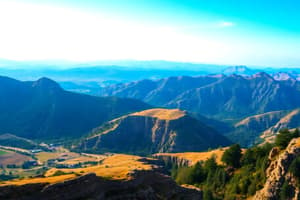Podcast
Questions and Answers
What is the primary focus of Human Geography?
What is the primary focus of Human Geography?
- The use of satellites to gather geographic data
- The analysis of landforms and physical processes
- The study of climate patterns and ecosystems
- The examination of human societies and their spatial relationships (correct)
Which concept refers to the exact coordinates of a location?
Which concept refers to the exact coordinates of a location?
- Relative Location
- Geographic Information
- Absolute Location (correct)
- Spatial Relationships
What method involves direct observation and data collection in the environment?
What method involves direct observation and data collection in the environment?
- Cartography
- Remote Sensing
- Geospatial Analysis
- Field Studies (correct)
Which branch of geography includes the study of biogeography?
Which branch of geography includes the study of biogeography?
What is the term for areas defined by unifying characteristics such as culture or climate?
What is the term for areas defined by unifying characteristics such as culture or climate?
Which tool is used for precise location tracking in geography?
Which tool is used for precise location tracking in geography?
What concept addresses how humans interact with their environment?
What concept addresses how humans interact with their environment?
Which branch of geography relies heavily on technology for data analysis and mapping?
Which branch of geography relies heavily on technology for data analysis and mapping?
Flashcards are hidden until you start studying
Study Notes
Definition of Geography
- Study of the Earth's landscapes, environments, and the relationships between people and their environments.
- Focuses on both the physical aspects of the Earth and human interactions.
Branches of Geography
-
Physical Geography
- Landforms, climate, ecosystems, and geophysical processes.
- Includes sub-disciplines like geomorphology, climatology, and biogeography.
-
Human Geography
- Examines human societies, cultures, economies, and their spatial relationships.
- Includes sub-disciplines like urban geography, cultural geography, and economic geography.
-
Geographic Information Science (GIS)
- Use of technology to capture, analyze, and interpret geographic data.
- Important for mapping, planning, and research.
Key Concepts
-
Location
- Absolute: Exact coordinates (latitude and longitude).
- Relative: Position in relation to other places.
-
Place
- Physical characteristics (landforms, climate) and human characteristics (languages, customs).
-
Region
- Areas defined by certain unifying characteristics (cultural, political, physical).
- Types: Formal (uniform), Functional (nodal), Vernacular (perceptual).
-
Movement
- The transfer of people, goods, and ideas across the Earth.
- Includes topics like migration, trade routes, and cultural diffusion.
-
Human-Environment Interaction
- How humans adapt to, modify, and depend on their environments.
- Concepts include sustainability and environmental challenges.
Methods of Geographic Study
-
Field Studies
- Direct observation and collection of data in the environment.
-
Remote Sensing
- Analyzing data from satellites or aerial imagery to gather information about the Earth's surface.
-
Cartography
- The art and science of map-making, essential for visualizing geographic data.
Tools Used in Geography
- Maps: Various types (thematic, topographic, political).
- GIS software: Analyze and visualize spatial data.
- GPS: For precise location tracking.
Current Trends in Geography
- Emphasis on sustainability and environmental issues.
- Increased use of technology (e.g., big data, virtual reality) in geographic studies.
- Globalization and its impact on cultural and economic geography.
Definition of Geography
- Geography is the study of the Earth's landscapes, environments, and the relationships between people and their environments.
- It focuses on both the physical aspects of the Earth and human interactions.
Branches of Geography
- Physical Geography studies landforms, climate, ecosystems, and geophysical processes.
- Sub-disciplines include geomorphology, climatology, and biogeography.
- Human Geography examines human societies, cultures, economies, and their spatial relationships.
- Sub-disciplines include urban geography, cultural geography, and economic geography.
- Geographic Information Science (GIS) uses technology to capture, analyze, and interpret geographic data.
- Important for mapping, planning, and research.
Key Concepts
- Location refers to a place's position on Earth.
- Absolute location is precise and uses latitude and longitude coordinates.
- Relative location describes a place's position in relation to other places.
- Place refers to the characteristics that make a location unique.
- This includes physical characteristics like landforms and climate, and human characteristics like languages and customs.
- Region is an area defined by certain unifying characteristics.
- Formal regions are united by a common characteristic (like a political boundary).
- Functional regions are defined by a central node and surrounding area. (Ex. a city and it's suburbs)
- Vernacular regions are defined by people's perceptions (ex. the "South").
- Movement refers to the transfer of people, goods, and ideas across the Earth.
- This includes topics like migration, trade routes, and cultural diffusion.
- Human-Environment Interaction explores how humans adapt to, modify, and depend on their environments.
- Concepts include sustainability and environmental challenges.
Methods of Geographic Study
- Field Studies involve direct observation and data collection in the environment.
- Remote Sensing analyzes data from satellites or aerial imagery to gather information about the Earth's surface.
- Cartography is the art and science of map-making.
Tools Used in Geography
- Maps are visual representations of the Earth.
- There are various types including thematic, topographic, and political maps.
- GIS software analyzes and visualizes spatial data.
- GPS (Global Positioning System) provides precise location tracking.
Current Trends in Geography
- Sustainability and environmental issues are increasingly emphasized.
- Technology (e.g., big data, virtual reality) plays a growing role in geographic studies.
- Globalization and its impact on cultural and economic geography are key areas of study.
Studying That Suits You
Use AI to generate personalized quizzes and flashcards to suit your learning preferences.




